Some main points lost in the discussion:
UFT president Mulgrew has basically changed his posture on the question of the teacher evaluation system.
Developments seemed all pointed towards go for the high-stakes test based evaluation system (20 percent of a teacher's rating from state tests, 20 percent from local --read, city-- assessments). Then in a mid-December delegate assembly of the union, the MORE caucus advocated a democratic vote by the rank and file members of the union. The Daily News was rare among news outlets to catch the significance of the action, albeit, in a December 29, 2012 editorial, and without naming the active party involved:
Far more pertinent, at a union delegate assembly, a motion opposing Mulgrew’s authority to reach an evaluation deal with Chancellor Dennis Walcott — demanding instead that the matter be put to the membership — won a stunning 30% of the votes. A union president accustomed to 95% support then ran scared. Before that, by some accounts, Mulgrew and Walcott appeared to be progressing toward a deal even though Mulgrew veered far and wide, wanting to discuss even next year’s school closures.
But then, last week, he demanded that the city and the union must first settle how the new system will be implemented and rolled out, and how teachers will be trained in it . . . .
(Read more at the Daily News.)
Published yesterday morning, January 17, 2013, before the early afternoon announcement of the evaluation talks breakdown, "Potent Mix of Politics Shapes Current Education Debate" in the New York Times Schoolbook, Tim Clifford, a New York City teacher penned another distinctively accurate representation of the MORE strategic position in Mulgrew's changing posture. He pointed out that MORE's activities around the evaluation have Mulgrew nervous, as his Soviet-style 91 percent victory could be difficult to replicate unless he make some moves to co-opt the mass energy pushing back against the value-added test-based evaluation system. Truthfully, the hand-writing was clear at the start of the week, with MORE's announcement of a rally (for a membership vote) outside UFT headquarters, set for half an hour before the delegate assembly. Here is the latter part of Clifford's Times article, with the crucial election year elements included:
It’s likely that both the city and the UFT want an evaluation deal. For Bloomberg, this could be his last chance effect a major change in how teachers are hired and fired after several failed attempts to get rid of LIFO (Last In First Out) rules for excessing and layoffs. Yet he has insisted that the deal must include a means of holding teachers’ “feet to the fire” by making evaluations public, which is not required by state law. For its part, the UFT had a hand in crafting the new Annual Profession Performance Review (APPR) in the first place, helping limit efforts to make standardized test scores count for more than 25% of a teacher’s grade.This writer is pleased that Mulgrew is speaking truth to power, calling mayor Bloomberg's assertions lies, however, the wish remains that he would directly and comprehensively reject the illogic undergirding these tests. Click again to the original, now classic, Gary Rubinstein statistical analyses of New York student test performances.
But there are other underlying political factors that may hinder an agreement. Foremost among these is the upcoming UFT election. Last time, Michael Mulgrew, then basically an unknown among teachers, won a staggering 91 percent of the vote as the protégé of outgoing president Randi Weingarten, facing no meaningful opposition. This time around, a new caucus has been gaining traction. This caucus, called MORE (Movement of Rank and File Educators), opposes any teacher evaluation agreement based on standardized test scores, which critics argue have a wide margin of error and other problems.
MORE’s candidate for president, Julie Cavanagh, is a well-spoken, well-regarded educator who is beginning to make a dent in Mulgrew’s hold on leadership. MORE’s recent resolution to have members vote on any evaluation deal, rather than union delegates mostly loyal to Mulgrew, garnered a significant amount of support. Said Cavanagh: “It is unacceptable that he (Mulgrew) does not recognize the truth: That the highest decision-making body of this union is its rank and file members. We should decide if ‘we as a union’ accept this: Because we are our union.”
Membership unrest in Chicago due to evaluations led to the ouster of the leadership there and conferred near hero status among unionists to Karen Lewis, who stood up to education reformers; the same could happen here if teachers are dissatisfied with the evaluation deal. And lest the potential mayoral candidates feel too sanguine, the story of Adrian Fenty, who was booted out as mayor of Washington, D.C. due largely to his support for test-obsessed Michelle Rhee, should act as a cautionary tale.
Complicating matters further is the teachers’ contract. The current deal expired in October, 2009, and the UFT did not receive the 4 + 4 percent over two years that other city workers got at the time. There is pressure on the union to settle a contract right away by tying evaluations to a new contract with higher wages, but there is also considerable sentiment that the UFT should wait out the Bloomberg era and try to get a favorable deal from the next mayor.
If Bloomberg and Mulgrew fail to come to terms on a contract, pressure will brought to bear on the current crop of mayoral hopefuls as to what kind of contract, with what kinds of wage increases, they’d be willing to sign. Democratic candidates are sure to vigorously court the UFT’s endorsement but by doing so they may risk losing financial support from Bloomberg, who will likely try to keep his reforms intact.
Other issues face the schools as we enter a new year. A bus strike is upon us. The city is looking to close 26 more schools, and is certain to be met with a fight. Governor Andrew Cuomo stepped into the fray in his State of the State address, calling for a teacher “bar” exam, as well as a longer school day and year that could add 300 hours to the school year without a clear means of financing those initiatives, which easily would cost billions of dollars in an age when school budgets have been cut every year for the last four years.
While the outcomes may not be certain, one thing is: 2013 promises to be a contentious year in education in New York. Whoever wins their political battles this year will likely affect the city’s schools well into the foreseeable future.
Why critical thinking is important: (Critical thinking ... something missing in the Common Core and the other new trends ... hmm.) This chart of Value-Added Measures, from an article by math instructor Gary Rubinstein, demonstrates how no real correlation can be drawn between the scores of students in one year with generally the same students in another year. (Actually, good fortune of down servers preventing access to the original Rubinstein post brings us to another mathematician's quite scattered plotting of test results. See below.)
* * *
Moreover, this writer points out that Mulgrew is still enthusiastically defending the indefensible: see "MULGREW TELLS DELEGATES SCUTTLED NEW EVALUATION SYSTEM WOULD BE GREATEST THING SINCE SLICED BREAD" at the ICE-UFT blog.
This blog said the following last week: "The UFT is willing to concede on almost everything but Bloomberg's people may make it so humiliating that President Mulgrew would not even get a fig-leaf out of this. On the other hand, the Union could demand real safeguards (a right to grieve any unfair evaluations) so the DOE would reject any agreement." We were almost completely right except it looks like it was the mayor and not the DOE that inserted the poison pills. The fig-leaf was the two year sunset clause and the expedited arbitration if procedures weren't followed.
Trust me these were not great gains.
What happens next? I see the UFT going over the mayor's head to the state to try to get the system into law. What should people be doing? Call, email or talk to your union representatives, particularly Unity Chapter Leaders, and tell them you want no part of this and the real fight in Albany and Washington DC is to change the law so that no part of any teacher's rating is based on junk science.
* * *
UNITY-UFT STANDING IN THE WAY OF A MEMBERSHIP VOTE
Yes, there is no new evaluation system. But the UFT leadership remains tarnished for blocking a membership-wide vote on the system. For, contracts are voted on by the membership. The evaluation system has contract-like effects and significance.
Additionally unsettling is that the Unity leadership used its staff director lecture the delegates back in December about what the democratic representation scope is for the delegates. Certainly, a great error in principal. This excerpt from the ICE-UFT blog's report of that earlier Delegate Assembly:
Leroy Barr was called on to refute Kit's points. Leroy said that the membership elects Delegates and Chapter Leaders to represent members and the DA has a proud history of these duly elected representatives doing their job.
UPDATES:
Back to the analysis of the talks breakdown, Mulgrew still won't own up to the reality that his tentative evaluation agreement --yes, it is debatable as to whether there was some deal ready in the middle of the night-- was morbidly flawed, given that it was resting on illogical premises of the VAM testing models. His complaints have been around secondary, yet still important, side-issues. (The same can be said for Leo Casey writing at EdWize. He still has not rejected the fundamentally flawed VAM basis for the evaluations.) It's understandable that they will not own up to the essential core flaw of the high-stakes test-based evaluation system, for they has to save face.
The MORE caucus on its website, "Post-Mortem: The Non-Deal Between the UFT and DOE," has cited three critical reasons behind the failure of the evaluation deal, with discussion of each reason:
--Reason #1: Race to the Top is Bad Policy
--Reason #2: A Growing Backlash against Education Reform
--Reason #3: High-Handed and Un-Democratic School Leadership
We cannot entirely rest and must be watchful. There are rumors that the UFT might try to squeak in a deal in the next few weeks.
THE PERSISTENT PROBLEM OF THE UFT'S TOP-DOWN, UN-DEMOCRATIC MANNER
It is being argued, and rightly so, that the UFT ought to release the Memorandum of Understanding (MOU), so that the UFT members may see what teacher evaluation agreement almost was agreed to. And just as the Great Powers' problem of secret negotiations and World War I, there is a major problem for democracy when the issues in the MOU are being kept from the members, as though we are young children.
New York City sends inspectors after the United Federation of Teachers after the breakdown of evaluations talks, UFT president Mulgrew tweets.
Right-minded teachers ought to oppose this harassment, this intimidation of our union.



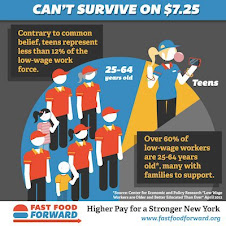









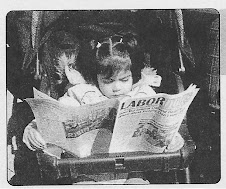
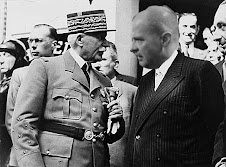

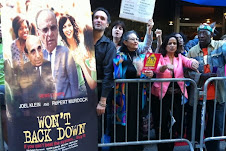






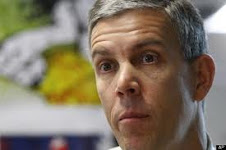





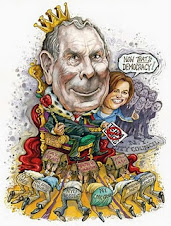




No comments:
Post a Comment